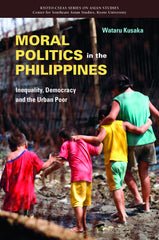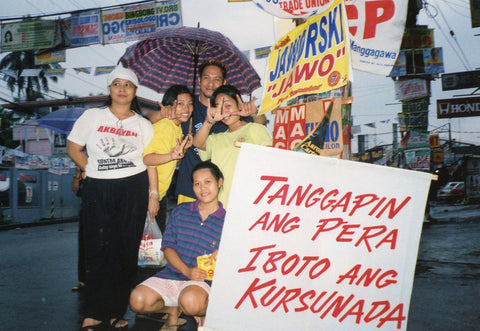Five Minutes with Wataru Kusaka May 5, 2017 11:00
In this edition of Five Minutes with …, we speak with Wataru Kusaka, author  of Moral Politics in the Philippines: Inequality, Democracy and the Urban Poor, who spent a year living in a slum/informal settlement in Metro Manila during his postgraduate studies. Dr Kusaka shares why he is deeply interested and invested in the study of civil society in the Philippines; why cultural anthropology and politics are a perfect disciplinary pairing, and why the moralization of politics is important to understanding the rise of populist politics around the world—from Trump to Duterte.
of Moral Politics in the Philippines: Inequality, Democracy and the Urban Poor, who spent a year living in a slum/informal settlement in Metro Manila during his postgraduate studies. Dr Kusaka shares why he is deeply interested and invested in the study of civil society in the Philippines; why cultural anthropology and politics are a perfect disciplinary pairing, and why the moralization of politics is important to understanding the rise of populist politics around the world—from Trump to Duterte.
What piqued your interest in cultural anthropology and politics in Southeast Asia and the wider region?
I first became interested in the region when, as a naïve teenager, I was shocked to learn about the atrocities committed by the Japanese imperial army during World War Two (WWII). That, together with the huge economic gap between Japan and Southeast Asian countries after WWII, drove me to expose myself to other Asian countries and cultures. I wished to change my positionality (which has been embedded in Japanese society) and mingle with local people as if I was one of them. Perhaps I wanted to breach the border that separates me and other people in the region. I became an active member of student-run NGOs, which had various projects of building simple infrastructure in Leyte, Philippines. This activity gave me opportunities to deepen my relation with the country and people. During my time as a political science undergraduate, I wanted to go beyond conventional political science theory and make my study more human-centric.

Dr Kusaka listening to some locals singing, and sharing coconut wine at nipa huts in Albuera, Leyte in August 2004 (note the graffiti) (Photo credit: Wataru Kusaka)

James C. Scott’s works* inspired me to combine political science and anthropology. I was also lucky to have two different supervisors in my interdisciplinary graduate school: Professor Hiromu Shimiz (a cultural anthropologist and Philippine studies expert) and Professor Seiki Okazaki (a political theory expert). Under their supervision, I developed my own approach that bridges concepts of normative political theory and grass roots realities in the field. I use the latter to examine and develop the former.
In your preface, you mention that your interest in the Philippines dates back to the early 2000s, when you were enthralled by the charm and wisdom of the Philippines, its peoples, and the way strong sense of civil society that exists in the country, as compared to Japanese people who tend(ed) to rely heavily on the state. Would you say that this comparison still stands in 2017?
I think the contrast is still valid. In the Philippines, the state has yet to provide a comprehensive welfare program to guarantee security for life to the people despite its high economic growth. Relationships in kinship group and civil society are much more important for one’s life than the state. On the other hand, the situation in Japan is getting worse because the state has further cut the country’s social budget and the private sector promotes flexible (and therefore less “stable”) forms of employment, giving us a sense of insecurity of life in a society where custom and network of mutual help has seriously been weakened.
Despite different degrees of mutual help that exists within societies, the conditions of “pre-welfare state” and “post-welfare state” overlap under neo-liberalism, and the linear developmental perspective that frames Philippines as a “developing country” and Japan as a “developed country” is no longer factual. Rather, I believe we need to identify commensurability between the two worlds so that we can share and learn each other’s ideas and practices for the betterment of our future.

You have written papers** on urban poor and Hansen disease patients in the Philippines, Filipino entertainers in Japan, and recently started a project on LGBT politics in Asia. Would you say that identity politics and the desire/need for representation are running threads in your research?
I have worked on very diverse topics because my friends kindly invited me to various research projects. Sometimes I feel like I do not have any consistent theme but I recently realized that I have chosen topics that are related to politics of the morally marginalized. I initially developed the view though my one-year fieldwork in a slum or informal settlement in Metro Manila. Although the dominant argument of civil society holds that moral citizens are indispensable for democracy, I realized that the urban poor, supporting their humble livelihoods from squatting or street vending, could not simply survive without breaking the law. With this finding, I started thinking that moral discourses that uphold civic values paradoxically justify marginalization, criminalization and elimination of those who have been framed as “immoral non-citizens.” I expanded my topic from the urban poor to other cases to demonstrate the argument.
You mention in your book that the "moralization of politics" refers to the transformation of interest politics, centered around resource distribution, into moral politics predicated on definitions of right and wrong. Under President Rodrigo Duterte, do you think his policies (especially his drug wars) have exacerbated existing divisions within society?
The moral antagonism I discuss in the book was contested along the class cleavage but it has changed its characteristics under the Benigno Aquino III and Rodrigo Duterte administrations. Aquino called for moral nationalism based on “civic decency” and implemented it though social policies such as conditional cash transfer which gave poor mothers cash incentives to encourage them to discipline their family.

A voter education poster in Pantranco, Quezon City in May 2004. It reads "Accept money, [but] vote your conscience" (Photo credit: Wataru Kusaka)
A major assumption behind it was that the poor were trapped by poverty because they lacked morality. However, not all of them were able to or willing to become “good citizens” because of structural limitations or reaction against moral intervention from the authority, which constructed the division between “good poor” deserved to be saved and helpless “bad poor.” Human rights violence under Duterte is generally tolerated because it mainly targets the latter poor, framing them as “hardheaded drug criminals.” In this sense there is a complicity between the moral-based social policy and extra-judicial killing.
Your book puts the spotlight on moral antagonism, followed by the rise of populism in the class divided Philippine civil society. Do you think that your argument of moral politics will help others understand the global trend of populism?
In many parts of the world, liberal democratic values are in decline and “populist” leaders have come to the forefront by exploiting the resentment of people who believe such values have, albeit its universal appeal, only further enriched elites. The Philippines is a good example of this, having experienced persistent inequality under American liberal democratic institutions. While growing global inequality brought about the rise of populism against liberal democratic values, the contestation involves not only interest politics over resource allocation, but also moral politics over authorities’ definitions of “good” and “evil.”

People crowding an outdoor polling place in Pechayan in May 2004
(Photo credit: Wataru Kusaka)
There will continue to be controversy within societies on whether liberal democratic values should be revived, or if different politics and values should be established and entrenched, which easily escalates the difference of ideas into moral antagonism. Conflict in interest politics can be addressed by adjustment of resource allocation but moral antagonism is hard to be reconciled. To make matters worse, such moral antagonism ends up increasing resentment within civil society and does not address the structural issue of unequal distribution of wealth. I am afraid that discourses of political correctness may also have a similar paradox of dividing society into the dichotomy of “good” and “evil.” I believe creating a new channel of deliberation beyond moral dichotomy is important to “tame” antagonism so to speak, and address inequality.
What are some projects you are working on now, and what are some topics you will be working on in the future?
Since the publication of the Japanese edition of Moral Politics in the Philippines in 2013, I have worked on how people can create mutuality beyond various moral divisions. I seek to highlight and understand another aspect of the Philippines: the spontaneous, autonomous, and anarchist creation of social order based on mutuality of the people. Stemming from this research interest, I have written a paper on the Filipino community in Japan as well as a paper on Hansen disease patients in Culion, and started new research on sexual minorities. I hope that these studies will create new knowledge on individual and collective survival in increasingly difficult times where we cannot rely on the state to provide for welfare and security.
****
* NUS Press published the Southeast Asian edition of James C. Scott's The Art of Not Being Governed: An Anarchist History of Upland Southeast Asia.
** For more information on Dr Kusaka's work, check out his website (posts in Japanese and English).
